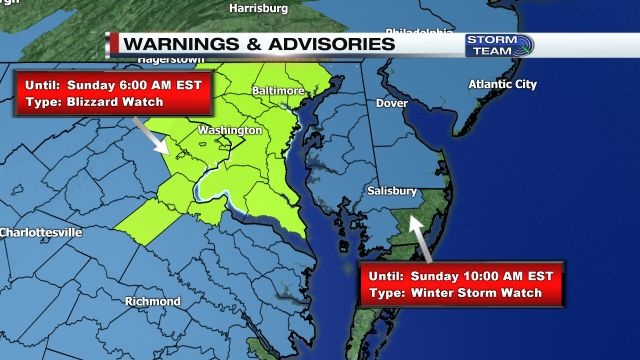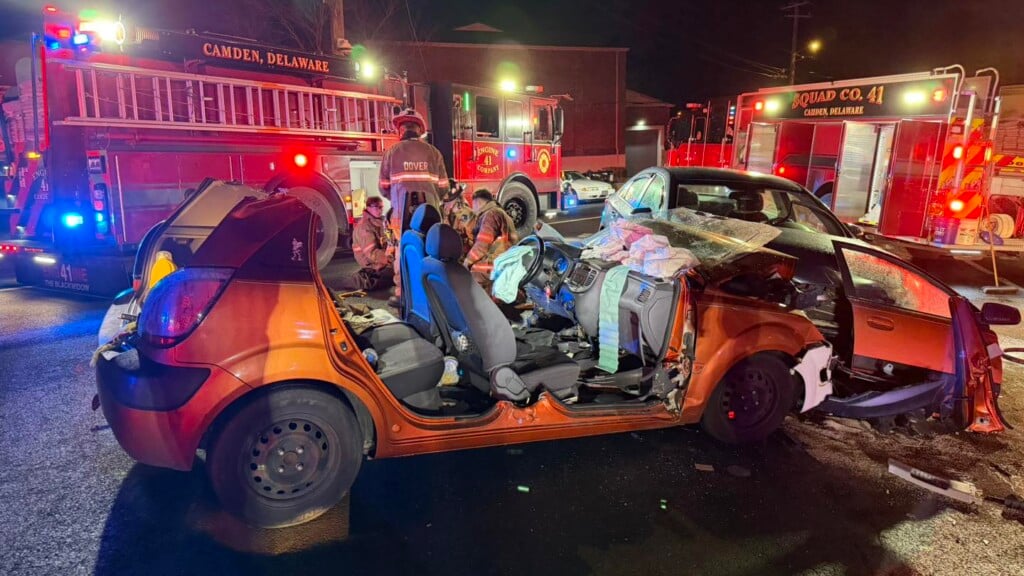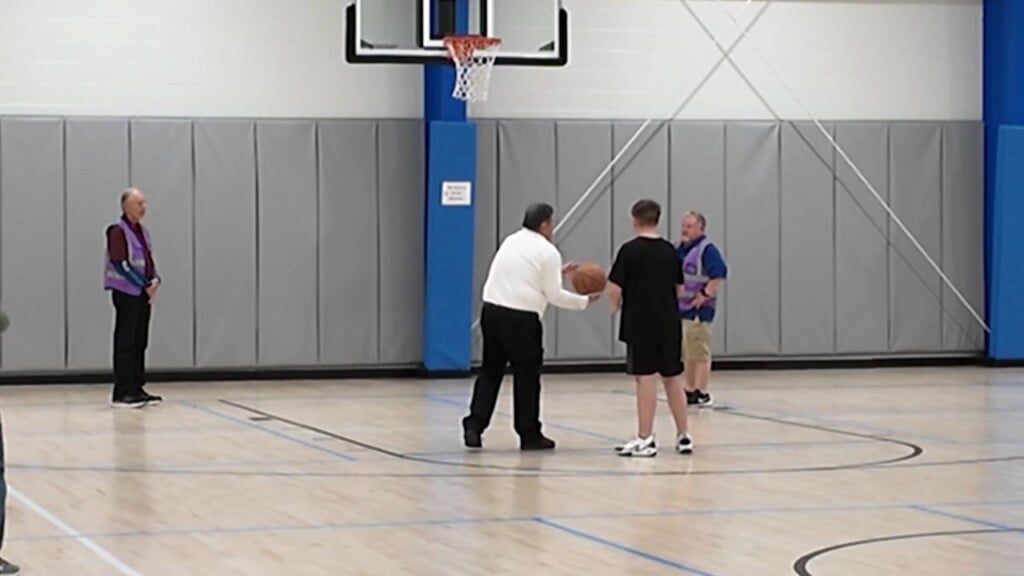Agencies around Delmarva urge residents to prep for possible storm

With the possibility of snow in the forecast, authorities are asking Delmarva resident to prepare themselves ahead of the storm.
The 47 ABC Weather Team is tracking the impending storm, and Chief Meteorologist Travis Michels says the lower portion of the peninsula will start to see snow around 3:00 PM on Friday. The snow is expected to continue to work its way north, and will continue until midnight for most areas of Delmarva. After midnight, the snow will turn to rain, before changing back to snow later in the day. The whole event is expected to wrap up by Saturday evening, with the central part of Delmarva getting between 3 and 7 inches, more in the northern counties. With the weather expected to be bad, area agencies are asking residents to prepare, and be ready for a possible emergency. For details, be sure to check out the 47 ABC Weather page.
Worcester County Emergency Services are urging residents to prepare now for severe weather. Their tips include, securing loose objects that are outside of the home, and prepare for possible power outages. They also note that hypothermia can happen quickly in low temperatures, but can be avoided by bundling up if heading out during the storm. They suggest wearing layers of lightweight clothing that can be added to or removed as needed, and protect extremities by wearing gloves and hats. Lastly, they ask to protect pets from the cold by bringing them indoors, and making sure that they have access to unfrozen water.
Virginia State Police say they will have troopers out and available to assist during the snow. “These storm systems have the potential to significantly impact the safety of motorists on our highways,” said Colonel W. Steven Flaherty, Virginia State Police Superintendent. “We encourage drivers who encounter adverse travel conditions to be prepared, be alert, remain patient, and to always drive to save lives.”
VSP offer the following tips:
Use headlights. Increasing your visibility helps you to avoid slick and dangerous spots on the road, as well as helps other drivers see you better.
Slow your speed. Though state police works closely with the Virginia Department of Transportation (VDOT) to identify problem areas on Virginia’s highways during a snow storm, drivers still must drive for conditions. Slowing your speed gives you more time to safely react and avoid a crash. Drive your vehicle based on your ability to properly maintain control of your vehicle.
- Don’t tailgate. You need increased stopping distance on slick road surfaces, especially at intersections. Give yourself more space between vehicles traveling ahead of you in order to avoid rear end collisions.
- Buckle Up. Most crashes that occur during winter weather are caused by vehicles sliding into guardrails, off the road or other vehicles. Wearing a seat belt protects you and your passengers from being thrown around the inside the vehicle and suffering serious injury in a crash.
- Check Your Vehicle. Make sure your vehicle is in good working order for the conditions. Fill up the tank in advance. Check windshield wipers, windshield wiper fluid, tire tread, battery life, etc.
- Don’t leave home without a window scraper, blanket, bottled water, snack, cell phone charger and flashlight.
Maryland State Fire Marshal’s Office are warning that the storm could knock out power. State Fire Marshal Brian S. Geraci is cautioning residents when using alternative light and electrical sources during power outages. “These easy to follow tips will help all Marylanders avoid injury or death during possible power outages,” said the State Fire Marshal.
The Fire Marshal’s Office also offers the following tips:
- Use flashlights during power outages instead of candles. Keep plenty of fresh batteries on hand at all times. If you prefer the look of candles, consider flameless battery operated candles that offer the flickering light without the potential fire hazard.
- If using candles, make sure they are placed on a stable piece of furniture in sturdy holders that will not tip over. Candles should fit in the holders securely and the holders should be made of material that will not burn.
- Keep candles away from anything combustible, such as; clothing, books, papers, curtains, decorations or anything else that can burn.
- Do not place candles where they can be knocked over by children or pets.
- Always extinguish all candles when leaving the room or before going to sleep.
- Never use candles, matches or lighters if medical oxygen therapy is used in the home.
- Check portable electric heaters for frayed/damaged wires and ensure they are clean and placed on a flat level surface. Use only “listed” by an approved testing laboratory equipment and follow manufacturer’s instructions.
- Do not use extension cords with portable space heaters. The extension cord can overheat and cause a fire. Always plug the cord directly into the outlet.
- If you use kerosene fuel fired heaters, use only “K-1” kerosene fuel. Never fill the unit inside, remove it to the exterior after it has cooled before refueling.
- Open a window enough to provide proper ventilation for fuel burning appliances.
- Keep combustibles (furniture, curtains, clothing, paper goods, etc.), at least three feet from all heat sources.
- Fuel burning appliances can produce the deadly, tasteless and odorless gas known as carbon monoxide. Install and maintain CO alarms inside your home to provide an early warning of carbon monoxide.
- Always turn off portable heating equipment when leaving the room for extended periods. Portable heaters should never be operated unattended.
- If you are depending on portable generators for electricity during power outages, use extreme caution when refueling. Fuel splashed on a hot muffler could ignite, causing severe burns and serious injuries.
- Never attempt to refuel a generator while it is running. Always allow the unit to cool before attempting to refuel.
- Operate generators outside of the home and outside of garages. Carbon monoxide gas produced by operating generators is poisonous and can quickly cause severe injury or death.
- Ensure placement of the generator does not allow carbon monoxide to enter the home through windows, doors or other openings.
The Fire Marshal’s Office is also asking residents with a fire hydrant on their property to clear the snow away, saving first responders time, in case of an emergency.
Maryland State Police is urging residents to stay home when the bad weather hits.
- Here are recommendations from state troopers:
- Stay home this weekend unless the nature of your employment requires you to travel (emergency responder, medical profession, snow removal etc.);
- Maryland State Police will begin towing vehicles currently abandoned more than 24 hours prior to the storms arrival;
- Once the snow emergency plan is put in place for a particular county, abandoned vehicles will be towed immediately;
- If you have to drive, ensure you are driving a vehicle equipped for snow travel;
- Don’t abandon your vehicle on a snow emergency route (interstate, MD or US route) without notifying Maryland State Police or the police agency responsible for that particular roadway;
- If you have called a private tow to remove your vehicle, let Maryland State Police know so we don’t dispatch resources to have it removed;
- If you have an accident, move your vehicle out of the travel portion of the roadway if possible and contact Maryland State Police;
- Give snow plows room to work and do not try to pass a plow train;
- If your vehicle is towed, contact the barrack or local police agency where it was abandoned with a full description (make, model, tag number and exact location) so the towing company information can be provided to you for pickup;
“For this snow storm, drivers should make informed decisions before they leave home because once you are on the highway, it may be too late to change your mind,” Maryland State Police Superintendent Colonel William M. Pallozzi said. “Make every effort to say off the highways if at all possible during the snow storm. Troopers are ready to address traffic crashes and delays and will be working in coordination with the State Highway Administration, Maryland Emergency Management Agency and other related agencies.”
The Delaware Department of Transportation says they are prepping their fleet for the possibility of snow.
The Sussex County Emergency Operations Center say that they are continuing to monitor the situation and cautions residents, particularly those in vulnerable areas, to take preparations now in advance of the expected winter weather.
“These are the types of storms that cause some of our greatest problems. You have heavy snow and rain, very strong winds, and significant flooding – it’s a mix of just about everything, and it’s not going to rush out of here quickly,” Sussex County EOC Director Joseph L. Thomas said. “The public should be prepared for impassable roads, downed trees and power lines, and power outages along the coast as well as inland. This could last into the first part of next week.”
They suggest property owners take time to secure loose objects, such as lawn items and trash cans, to prevent winds from turning those items into projectiles. Also, residents in low-lying areas should make sure submersible pumps are working and check storm drains to ensure they are clear of debris.


